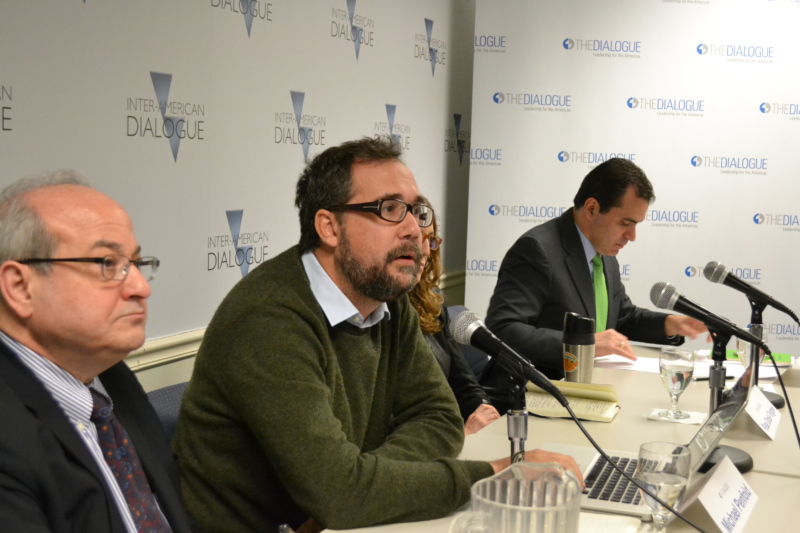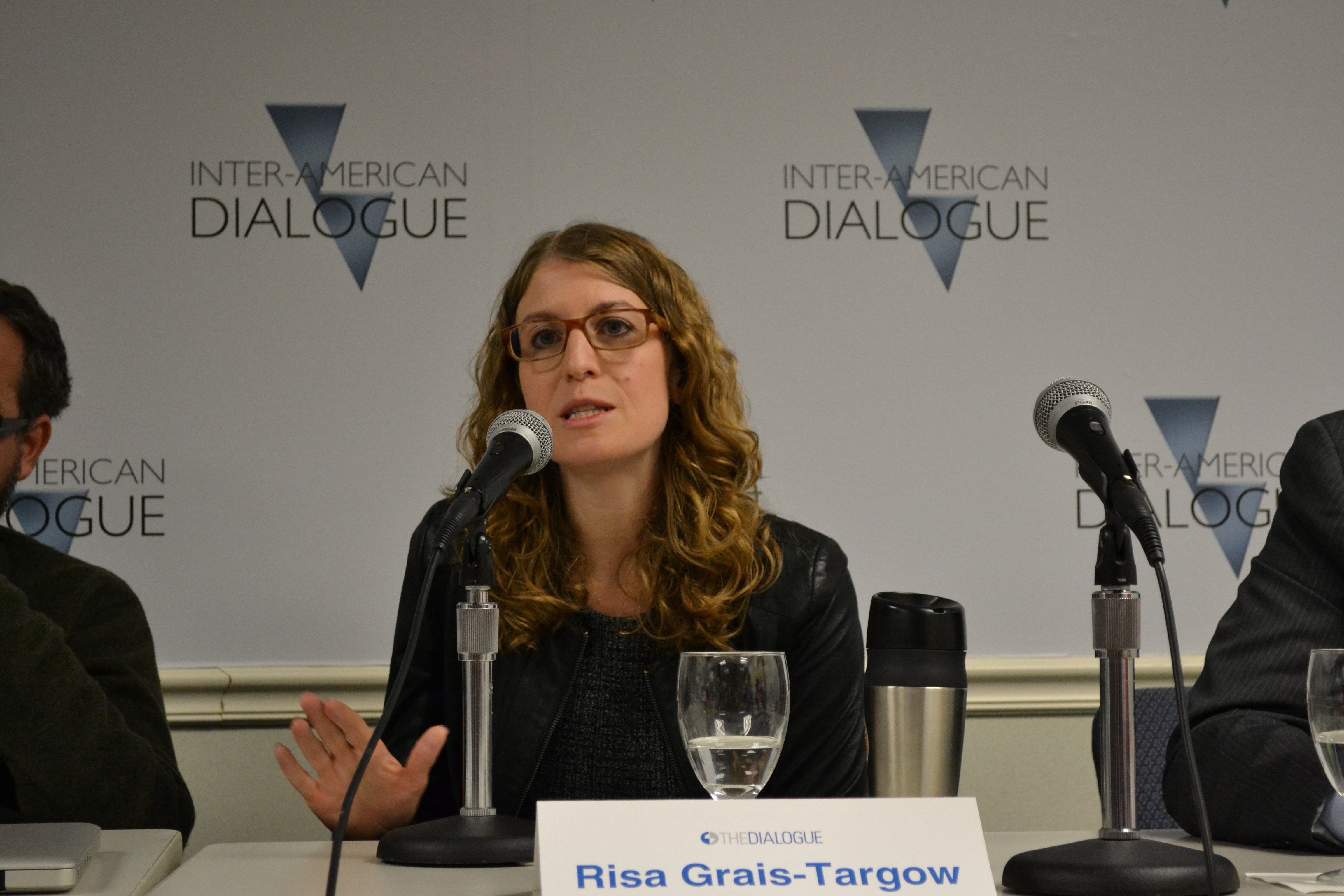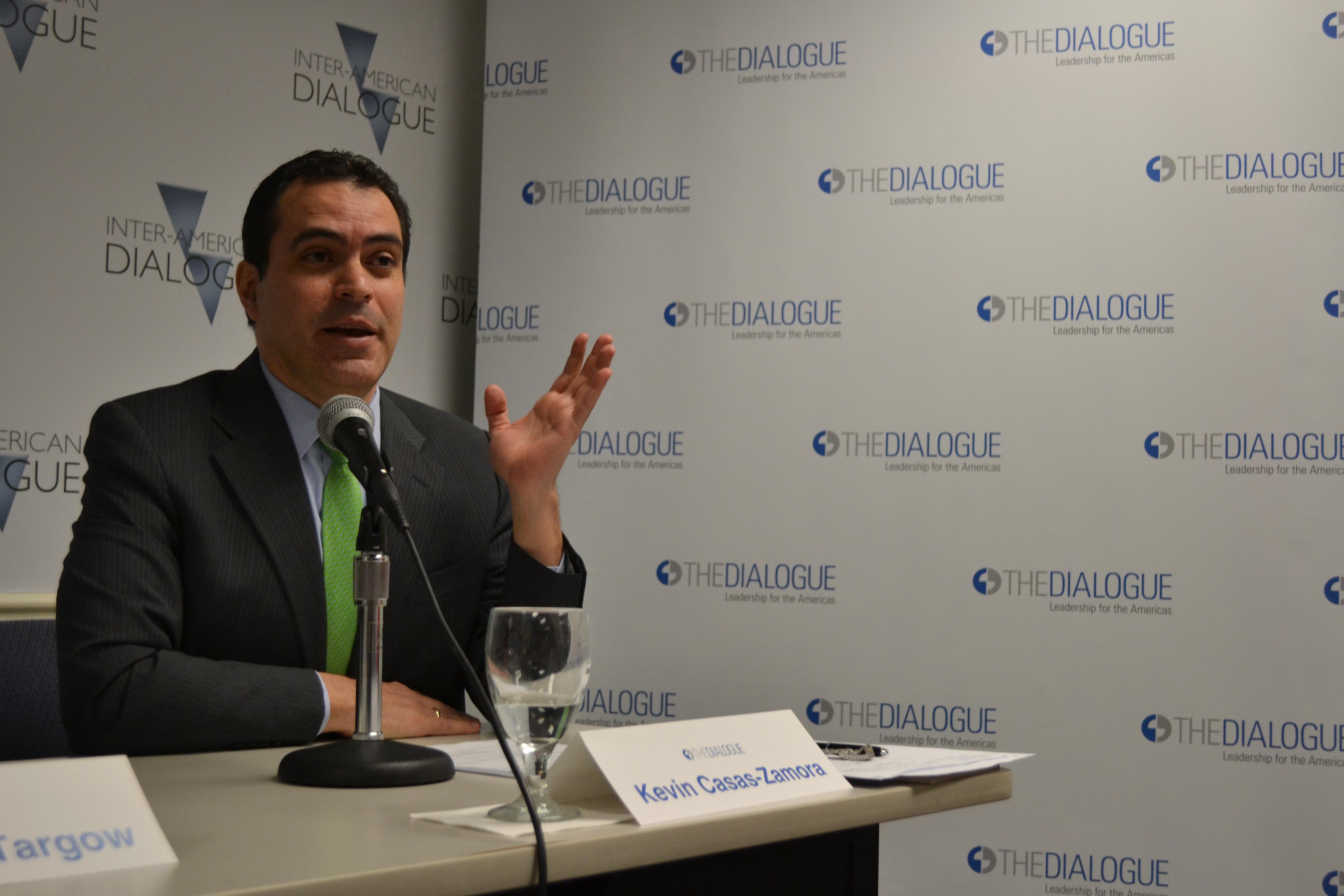Venezuela’s Continuing Crisis
 Photo by Ben Raderstorf / Inter-American Dialogue
Photo by Ben Raderstorf / Inter-American Dialogue
On March 2nd, 2016, the Inter-American Dialogue hosted an event on “Venezuela’s Continuing Crisis”. The event consisted of a presentation by Michael Penfold, professor of Political Economy at IESA, and comments by Risa Grais-Targow, senior analyst at the Eurasia Group, and Kevin Casas-Zamora, senior fellow and director of the Peter D. Bell Rule of Law Program at the Inter-American Dialogue. The event was moderated by Michael Shifter, president of the Inter-American Dialogue.
Penfold started his presentation by explaining the three types of economic crises that Venezuela faces: a balance of payments crisis, a fiscal crisis, and a productivity collapse. Penfold attributed the first to declining oil prices and lack of access to financial markets, the second to the deficit-to-GDP ratio (20%), and the final to the collapse of private business. According to Penfold, the economy and real wages keep contracting rapidly, diminishing expectations of change and increasing social discontent. He added that the liquidity crisis has also worsened and that the government has tried utilizing past strategies that no longer work. Penfold insisted that the political crisis the country faces developed because the economic context that caused civil services to decay, affecting citizen security in the country.
2016 is the “make or break” year for Venezuela, since the government already made the “easy actions” last year to deal with the crisis.
Penfold attributed the weakening of chavismo to a loss in electoral competitiveness, caused by the electorate’s desire for economic change. While chavistas are no longer majority, he described them as the “largest minority,” emphasizing that they are still a relevant political force. Penfold identified two main political conflicts in Venezuela. First, the government’s political prisoners and the opposition’s amnesty law. Second, the opposition’s attempts of ousting President Maduro through constitutional means and the executive branch’s resistance. As chavistas seek to control the transition into the next administration, the executive branch will try to hold the presidential office until Maduro’s fourth year, when instead of having a recall election the vice president would assume office. Penfold stated that the opposition’s best course of action would be to limit presidential and legislative terms yet he mentioned that the problem would be that the bill would end up being evaluated by the Supreme Court. Even if the Supreme Court were to approve it, Penfold noted that they would not allow for retroactive application. Ultimately, Penfold added that the social crisis, the most unpredictable of all factors, will define the next stage of the process. He also highlighted that it is in everybody’s interest for change to take place, meaning that chavistas will be willing to look for a solution even if it only benefits them.
[caption id="attachment_47544" align="alignleft" width="374"] Risa Grais-Targow / photo by Ben Raderstorf / Inter-American Dialogue[/caption]
Risa Grais-Targow / photo by Ben Raderstorf / Inter-American Dialogue[/caption]Grais-Targow emphasized how foreign exchange was the most pressing economic problem, given the reduction in oil income – the only source of foreign exchange in Venezuela. She described 2016 as the “make or break” year for Venezuela, since the government already made the “easy actions” last year to deal with the crisis. If Venezuela were to default, she said it would be in a disorderly fashion and it would be complicated by political uncertainty. Grais-Targow stated that the main concern for chavistas should be to find creative ways to get to 2017, which might be difficult given internal divisions and a growing frustration with Maduro. She supported Penfold’s observations of social unrest being the determining factor of the future. Grais-Targow also noted that regime change was on the horizon, even if a smooth transition is hard to envision.
Casas-Zamora discussed literature on democratic breakdowns and transitions in the context of the Venezuelan crisis. Among issues highlighted by Casas-Zamora was the apparent irrationality of actions taken by government actors, such as “erratic appointments” like Luis Salas as economic minister. Casas-Zamora added that the levels of corruption showed signs of a kleptocracy, which help explain actions that chavistas take to stay in power. Casas-Zamora emphasized the role that the military may play in the transition, indicating that regardless of whether they support the government in the event of a social explosion, opposition demonstrations or a successful negotiation, they may emerge as the “big arbiter of politics in Venezuela.” When a transition into a new regime takes place, he stated that the armed forces may serve as the guardian of politics until the new regime is established. Casas-Zamora concluded his comments on a rather positive note, “a tragedy in Venezuela is not inevitable. There is no guarantee that it will happen. One can only hope.”
[caption id="attachment_47547" align="alignright" width="375"] Kevin Casas-Zamora / photo by Ben Raderstorf / Inter-American Dialogue[/caption]
Kevin Casas-Zamora / photo by Ben Raderstorf / Inter-American Dialogue[/caption]During the round of questions, a participant commented on how the oil crisis signals the failing of the politico-economic model rather than just Maduro. The participant questioned Casas-Zamora’s assumption of the military playing a central role in the transition since he perceived the military to be part of the current problem. Other questions regarding the role of Cuba and China, also surfaced. Finally, Shifter also asked whether voters were disillusioned with the opposition following the expectations that the electorate had of them.
Casas-Zamora highlighted how in other cases of democratic transitions in Latin America, while corrupt the military played an integral role in having an orderly transitional process. He added that the most relevant foreign actor in respect to the crisis is Cuba, which has the power to persuade government towards acting rationally. On the other hand, Grais-Targow emphasized the role of China as potentially the most influential actor. Grais-Targow also insisted that the military will be willing to negotiate towards a transition. Penfold answered Shifter’s question by positing that the past vote was a voto castigo, one of “punishment” for Maduro’s regime given public discontent with the economy.
As concluding remarks, Penfold noted the most important factors in the current political crisis: electoral competitiveness, the “international front”—important for chavismo since relations with countries like Brazil and Argentina have changed—and the military, which he predicts will want to play by “constitutional rules.” Penfold insisted that the government has the opportunity to access financial markets yet the fixation on the political system by the chavistas has prevented them from doing so. Finally, Penfold described the loss of the parliamentary supermajority for the opposition as a loss of power to negotiate, which he insists the opposition desperately needs.



















